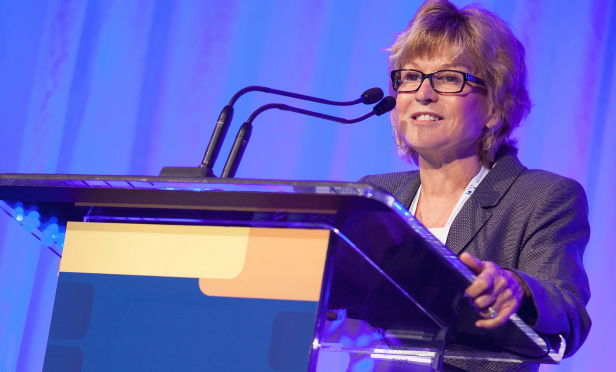 We are heading toward the longest economic expansion in history, but there are a few landmines that could slow, stall or even reverse the growth. “We've had a slow recovery followed by an adrenalin shot from the tax cut which has extended our economic expansion,” Judy Hoffman, president of Trigild and the founder of the Trigild Lender Conference, tells GlobeSt.com. Hoffman says that there could be a recession on the horizon as a result of some of the instability in the market. Unlike the previous recession, these potential economic disruptors are largely politically motivated.
We are heading toward the longest economic expansion in history, but there are a few landmines that could slow, stall or even reverse the growth. “We've had a slow recovery followed by an adrenalin shot from the tax cut which has extended our economic expansion,” Judy Hoffman, president of Trigild and the founder of the Trigild Lender Conference, tells GlobeSt.com. Hoffman says that there could be a recession on the horizon as a result of some of the instability in the market. Unlike the previous recession, these potential economic disruptors are largely politically motivated.
“It feels like there are more landmines than ever—and much of the uncertainty stems from our political climate. I was surprised to read that 42% of Americans say President Donald Trump should be impeached and removed from office, which is only one point lower than the 43% who said the same of Nixon in a March 1974,” Hoffman says. “No matter what your politics may be, this tells me that there is a large degree of uncertainty in our political climate and uncertainty always gives me pause.”
In addition to the acrimonious political climate, policy changes could also have a negative impact on economic growth. The current trade tariffs and potential trade disputes. “I'm concerned about the unforeseen consequences of a trade war and the potential restructuring of NAFTA,” adds Hoffman. “Manufacturing a product, and even providing a service, is often interlinked with many other companies in numerous countries. Look at an Apple iPhone. To make an iPhone, the manufacturing process encompasses 24 companies that are in 11 different countries. It's possible that a trade war could have a ripple effect and make a greater impact than anyone predicts.”
The big concern on most investors' minds, however, is the rising interest rates. The Fed has increased rates several times thins year, and there are likely more increases on the horizon. “Interest rates are also increasing, but not rapidly. Right now, inflation seems to be in check but if we truly have trade wars, that can change quickly,” adds Hoffman. “Additionally, in spite of the low unemployment rate, wages are increasing only modestly –presumably because the baby boomers are retiring and being replaced by younger people who don't command as high a salary. However, the Fed has been clear that they want the rate to go up so they will have more levers to pull during the next recession. If the economy overheats, we could see that happen at a faster rate. It's important to remember that a lot commercial real estate was bought in a low interest rate environment and if valuations do not keep up, refinancing could be difficult.”
Hoffman is hosting the Trigild Lender Conference on October 17 and 19 to gather leaders and discuss the economic concerns. “Investors want to know if cap rates growth will outstrip property income growth, what are the investment trends and the impact of interest hikes,” says Hoffman. “They also want to learn about specific trends by asset class and market.”
The event will include non-performing and performing commercial debt specialists, as well as legal experts that can weigh in on critical legal aspects of these deals. The roster of experts include dealing with defaulted loans, how EB5 funds fit into the capital stack and the impact on legalized marijuana on loans. “CMBS special servicers, and balance sheet and agency lenders, share what they are seeing in their nonperforming loan portfolios now, what they expect to see in the future, and what factors will impact it,” says Hoffman. “They also discuss issues and solutions for these issues that they are dealing with now and will deal with in the future.”
© Touchpoint Markets, All Rights Reserved. Request academic re-use from www.copyright.com. All other uses, submit a request to [email protected]. For more inforrmation visit Asset & Logo Licensing.






